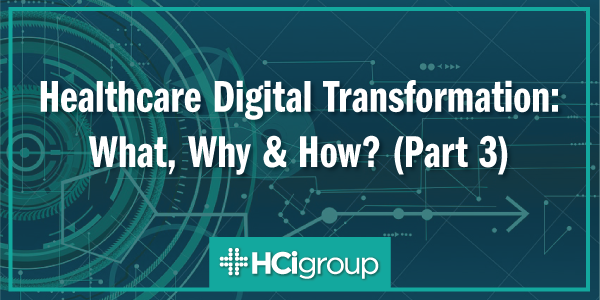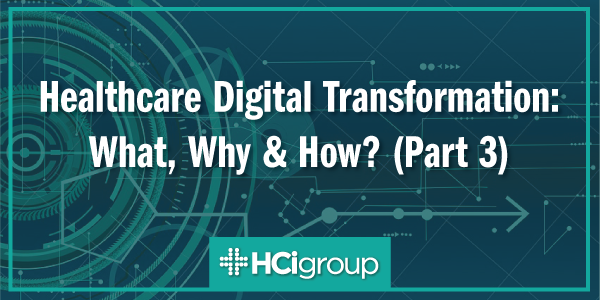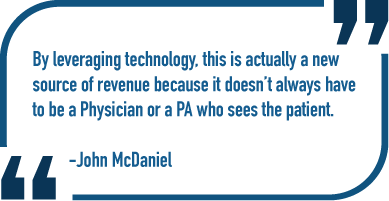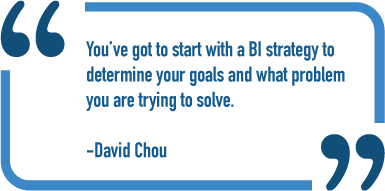Healthcare Digital Transformation: What, Why & How? (Part 3)


This is part 3 of 3 in our "Healthcare Digital Transformation: What, Why & How?" blog series.
Following our recent webinar, The Journey Toward Digital Transformation, we sat down with digital transformation executive, visionary leader and CIO of Children’s Mercy Hospital, David Chou, and HCI Executive Vice President of Technology & Innovation, John McDaniel to respond to questions that were submitted by audience members. The conversation hit on several topics and trends surrounding digital transformation in healthcare.
If you missed the first two parts of this series, follow these links to catch-up:
- "Healthcare Digital Transformation: What, Why & How? (Part 1)"
- "Healthcare Digital Transformation: What, Why & How? (Part2)"
Do you think there is a growing acceptance of non-core revenue opportunities, such as going away from the traditional model of care delivery, and justifying these costs with technology?
David Chou
Yeah, there definitely is. If you look at some of the EHR providers in the ambulatory world, they give out their product for free, but they have all sorts of advertisements. This is starting to happen and I just don’t know how well it will be received and utilized by a bigger entity, especially health systems. I’m not sure whether that is going to be received well by the consumers, but definitely something to think about. There is a lot of opportunity for revenue to be earned because of the advertising. But health systems should be careful about advertising with the right companies, especially when it comes to something like pharmaceuticals.
John McDaniel
I agree. The two areas I see the greatest demand for, in terms of looking at new sources of revenue, is the whole retail approach and the use of data. There are several organizations today that are basically developing those online applications, sort of tied to EHRs, where we know what drugs someone’s taking or what specific devices they might need, and we can have them order online – that is a new source of revenue.

The other one, and I need to be careful with this one because we don’t want to re-sell the data, but we have so much data available for research. If we could de-identify that data, use it on a broader scale, to enable more effective research of a broader pool of individuals through sharing of that data...there are organizations who are ready and willing to pay.
I see all kinds of different sources of new revenue, in addition to enhancing how we look at revenue today. If you look at the average cost of a total health session, not the cost, but the average revenue for health sessions, it’s roughly $44 for about 15 – 20 minutes of time. By leveraging technology, this is actually a new source of revenue because it doesn’t always have to be a Physician or a PA who sees the patient.
What is the best business intelligence (BI) strategy for a group of hospitals, which is moving to Epic from a 15-year old HIS system?
David Chou
I would go back to what John alluded to about starting with a strategy. You’ve got to start with a BI strategy to determine your goals and what problem you are trying to solve. BI can be kind of dry; you can build an enterprise warehouse, or something to provide the organization with access to data, a lot easier than physicians having to rely on a technical report writer. So it’s about understanding, what is their goal?
Second, you need to look at your entire journey of going from paper to an electronic health record. You probably need to start thinking about what kind of data definitions you need, especially from a system design perspective, because that’s going to be critical. You want to make sure that you’re able to pull the data from the right field and have that data definition defined. And with data governance, you probably need to think about that early on, once you a bunch of people who are touching data. What kind of structure and format are you going to have, in terms of access? How are you going to allow researchers to have de-identified data for research perspective?

Most importantly, once you have the structure to identify cost (every organization struggles with figuring out the overall cost for taking care of a patient). During this journey of moving toward an electronic platform, it’s an important time to plan and think about answering some specific operational questions that can help you perform better. BI strategy is such a wide variety, and a wide array of solutions. I would just start with developing the strategy and answering a few key questions that pull the right stakeholders together from a governance perspective.
John McDaniel
I totally agree with what David just said. Governance is becoming very important as you start to aggregate data from a BI perspective. The only caveat I have is, not caveat, the only question I have is that not every single piece of data that you need is in the right format today. So, interoperability is going to be something that’s very important for organizations to consider. How do I move that data into a warehouse, or whatever it might be, so that I can do the type of analytics I want to do on it? More importantly, how do I preserve that data and make sure that it is, back to the governance point, that it is the most current, and accurate data available?
This is a really critical space. The second part of it is, how important is it that that data be updated in a dynamic manner? In many cases, and I know you don’t want to print all this, but HL7 is a great tool, but the ability to move data dynamically is really a challenging. The other part of is that there’s not a lot of digital health information, I’m talking about biomedical devices and other type data points. So how do I aggregate all the data that I really need to make that happen? I start with identifying other data points that I need, who owns those, establish standards around them, and move that data into whatever tool I’m using.
It’s a puzzle, isn’t it David? It’s like putting a big, massive puzzle together, and yet lot of the pieces aren’t quite ready yet.
Checkout these recent digitial transformation healthcare blog posts:
- Healthcare Digital Transformation: What, Why & How? (Part1)
- Healthcare Digital Transformation: What, Why & How? (Part2)
- Digital Transformation = Cultural Transformation
- 3 Roadblocks to Digital Transformation
- David Chou on Leading Digital Transformation
To learn more about Digital Transformation and how HCI can support your efforts, please contact us using the button below.

